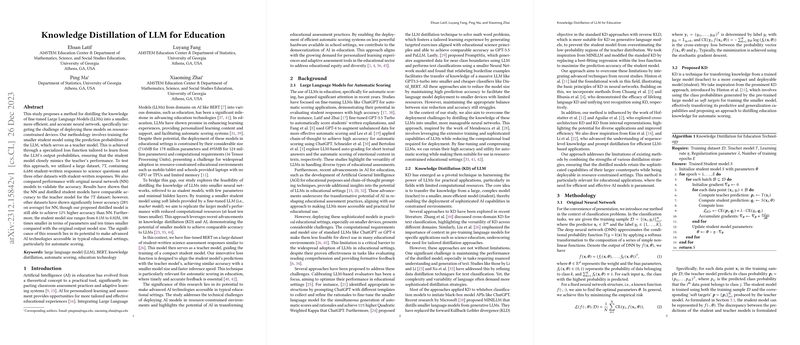Introduction
The integration of AI and LLMs into education has resulted in significant advancements in personalized learning experiences. LLMs show promise in enhancing learning by providing personalized content, supporting learning, and facilitating automatic scoring systems. However, their deployment faces challenges due to their large size and computational requirements. This is particularly problematic for educational environments with hardware limitations such as mobile devices, tablets, and school-provided laptops without high-end graphics processing units or tensor processing units.
Knowledge Distillation for LLM
The paper examines the distillation of knowledge from fine-tuned LLMs into smaller, more manageable models, allowing them to run on devices with fewer resources. This process involves a "teacher-student" learning approach where a smaller "student" model is trained using the predictive probabilities generated by a larger LLM, known as the "teacher" model. Advanced techniques involving specialized loss functions are used to instruct the student model not only to mimic the LLM's performance but to do so with a fraction of the computational requirements.
Empirical Validation
Researchers conducted experiments using a significant dataset, labeled 7T, containing thousands of student-written responses to science questions, along with three additional datasets in the educational domain. The smaller models trained via knowledge distillation were compared with original neural network models in terms of their accuracy in automatic scoring. The distilled student models displayed comparable accuracy to the LLM when tested on the 7T dataset and higher accuracy than original neural networks on other datasets while being considerably smaller in size and computational load.
Impact on Education
The implications of using distilled models in education are far-reaching. By enabling effective automatic scoring systems to operate on less powerful hardware, this research contributes to the democratization of AI in education. It offers a viable solution to the problem of deploying sophisticated AI models in resource-constrained environments and aligns with the increasing demand for personalized learning and adaptive assessment tools in the educational sector. The paper provides a proof of concept for the successful application of knowledge distillation in educational technology, highlighting its potential to transform educational assessment practices and ensure equitable access to advanced AI technologies in typical school settings.
